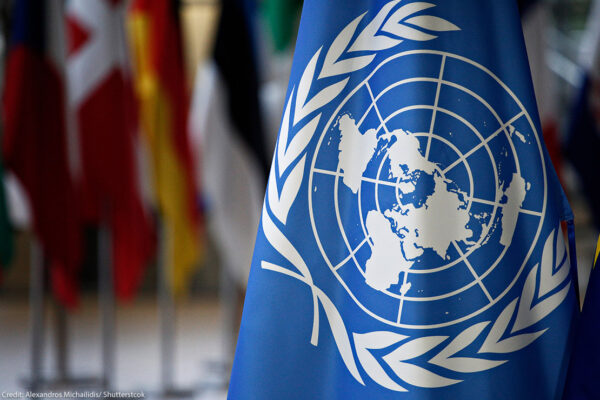
Biden's Asylum Policy is From Trump's Playbook
May 4, 2023
As soon as a week from today, the Biden administration could implement a policy that would force people to seek asylum and wait for an answer in Mexico, or another country they passed through, with limited exceptions. The proposed change is based off of a Trump-era policy that the ACLU fought in court, and which President Biden previously condemned. It also stands in direct violation of United States asylum laws and will lead people fleeing violence and persecution to face avoidable harm.
President Biden campaigned on promises to restore and strengthen the asylum process. Instead of re-committing the United States to its promise of upholding international humanitarian practices, his administration plans to replace the inhumane Title 42 policy enacted under the Trump administration with a similarly dangerous one, taken straight from the Trump administration's playbook.
Baine Bookey, legal director of the Center for Gender and Refugee Studies, and Katrina Eiland, managing attorney for the ACLU’s Immigrants' Rights Project, join us today to unpack this rule, the harm it will cause thousands of people, and to explain what the asylum process should look like.
In this episode
Kendall Ciesemier

This Episode Covers the Following Issues
Related Content
- Press ReleaseApr 2025

National Security
Human Rights
Human Rights Advocates Sue Trump Administration Over Sanctions Targeting Icc. Explore Press Release.Human Rights Advocates Sue Trump Administration Over Sanctions Targeting ICC
WASHINGTON — Two U.S. human rights advocates are challenging the Trump administration’s executive order imposing sanctions on the chief prosecutor of the International Criminal Court (ICC). As the lawsuit explains, these sanctions violate the First Amendment by prohibiting the advocates, and other Americans like them, from speaking with the ICC’s Office of the Prosecutor, including by providing legal advice, expert analysis, and evidence. “The International Criminal Court is where victims of grave human rights violations turn when national legal systems fail to provide justice,” said Charlie Hogle, staff attorney with ACLU’s National Security Project. “Blocking our clients and others like them from doing their human rights work is unconstitutional.” Under the executive order, people in the U.S. who’ve devoted their lives to seeking justice for the victims of atrocities—like the genocide of Myanmar’s Rohingya people, or gender-based violence committed against Afghan women under the Taliban—could face stiff penalties simply for exercising their constitutional right to engage and advocate with ICC investigators and prosecutors. “Because of this order, I’ve been forced to stop helping the ICC investigate horrific crimes committed against the people of Myanmar, including mass murder, torture, and human trafficking,” said Matthew Smith, co-founder and CEO of Fortify Rights. “This Executive Order doesn’t just disrupt our work—it actively undermines international justice efforts and obstructs the path to accountability for communities facing unthinkable horrors.” Matthew Smith and Akila Radhakrishnan are suing because the executive order forced them to stop working with the ICC’s Office of the Prosecutor and indefinitely paused their efforts to hold leading rights violators accountable for horrific crimes. As the lawsuit explains, the First Amendment does not allow the government to impose such sweeping limits on what Americans can say, and to whom they can say it. “Victims of the Taliban’s oppression can’t rely on their own courts for justice. That’s why they turn to the ICC, and why it's so important for me to be able to partner with them in their fight for justice and accountability,” said Akila Radhakrishnan, an international human rights lawyer. “I’m bringing this suit to prevent my own government from punishing me for trying to hold the Taliban accountable for its systematic violence against women and girls from Afghanistan.” The international community, including the United States, established the ICC in 1998 to help maintain international peace and security. The ICC investigates and prosecutes crimes of the severest magnitude—including genocide, crimes against humanity, and war crimes—when domestic courts are unwilling or unable to do so. Today, 125 countries have joined the ICC’s founding treaty, known as the “Rome Statute.” As the lawsuit explains, although the United States has not ratified the Rome Statute, it has supported the ICC’s critical work on a wide range of matters. This lawsuit was filed in the United States District Court for the District of Maine by the ACLU and ACLU of Maine on behalf of Matthew Smith and Akila Radhakrishnan. In 2020, when President Trump imposed similar sanctions, the ACLU sued on behalf of human rights experts who were forced to stop working with the ICC. Our clients withdrew their lawsuit when President Joe Biden rescinded the sanctions, but a federal court in a separate suit agreed the sanctions likely violated the First Amendment.Court Case: Smith v. TrumpAffiliate: Maine - News & CommentaryFeb 2025

Human Rights
The Targeted Chaos Of Trump’s Attacks Against International Human Rights Law And Justice. Explore News & Commentary.The Targeted Chaos of Trump’s Attacks Against International Human Rights Law and Justice
Donald Trump has positioned his administration to launch one of the most abusive and aggressive assaults on human rights in U.S. presidential history.By: Jamil Dakwar - Press ReleaseFeb 2025

Racial Justice
Human Rights
New Report Finds Nevada’s Lithium Mine Permit Violates Indigenous Peoples’ Rights. Explore Press Release.New Report Finds Nevada’s Lithium Mine Permit Violates Indigenous Peoples’ Rights
WASHINGTON — The U.S. government’s decision to permit Lithium Americas to mine at Thacker Pass in Nevada violated Indigenous people’s rights, Human Rights Watch and the American Civil Liberties Union said in a report released today. The nearly 18,000 acre mine is under construction and will extract lithium from one of the world’s largest known deposits. Researchers found in the 133-page report, “The Land of Our People, Forever,” that the Bureau of Land Management, the government agency responsible for managing federal land, permitted the Thacker Pass mine in northern Nevada without obtaining the free, prior, and informed consent of Indigenous people. The Numu/Nuwu and Newe, or northern Paiute and western Shoshone in English, experienced violations of their rights to religion, culture, and to their ancestral lands under international human rights law and standards. While there may be others, at least six tribes have connections to the land at Thacker Pass. “Obtaining the minerals necessary for an urgent phaseout of fossil fuels should include protection for the rights of Indigenous peoples,” said Abbey Koenning-Rutherford, Aryeh Neier fellow with the American Civil Liberties Union and Human Rights Watch. “U.S. federal and state mining agencies should urgently review the regulations governing mine permits to bring them in line with international standards on Indigenous peoples’ right to free, prior, and informed consent.” Between September 2023 and January 2025, Human Rights Watch and the ACLU interviewed 41 Indigenous community members, journalists, lawyers, and experts about the impact of the mine. Researchers also reviewed litigation, scientific studies, news and social media, satellite imagery, and environmental maps. Lithium is a mineral used in the batteries for electric cars and other renewable energy technologies that are considered critical for phasing out fossil fuels and mitigating climate change. But in October 2024, a United Nations panel stated that “urgency of the energy transition cannot justify irresponsible practices in mining” and said that governments should uphold the rights of Indigenous peoples. The Bureau of Land Management approved the mine on Jan. 15, 2021, claiming contact with tribes, but its direct outreach was limited to three rounds of mailings to three Tribal governments. Lithium Americas and General Motors, the companies developing the mine, moved forward despite opposition from at least five Tribal governments, Human Rights Watch and the ACLU found. U.S. courts rebuffed tribes’ efforts to challenge the adequacy of the consultation process after the agency had issued the permit. One, the Fort McDermitt Paiute-Shoshone Tribe, has since signed an agreement with Lithium Americas and issued a letter supporting the mine. The construction work has prevented Numu/Nuwu and Newe Indigenous peoples from accessing parts of Peehee Mu’huh, the Indigenous name for land in the area. Tribal residents also expressed fears that the mine threatens their rights to health, a healthy environment, and water. The land around Thacker Pass is particularly significant as it includes areas where people fled and died during an 1865 U.S. cavalry massacre. Tribal members pay tribute to their ancestors, annually commemorate the massacre, and engage in other religious practices on the land. “Bands of northern Paiutes, western Shoshones and Bannocks have a history with the United States Government,” said Gary Mckinney, spokesperson for People of Red Mountain, an Indigenous rights organization. “That history includes mining, broken treaties, and Indian reservations which were established to assist in unwarranted land degradation caused by mining and livestock grazing on ancestral Paiute, Shoshone and Bannock hunting and gathering landscapes.” U.S. law provides Indigenous peoples with little protection of their ancestral land rights outside of reservations. The outdated 1872 mining law gives U.S. citizens, including companies, the ability to claim mineral rights on most federally owned land, the vast majority of which was confiscated from Indigenous peoples. The Thacker Pass mine permit was set in motion in part by this 1872 law. “The Thacker Pass mine stands as a warning of the risks Indigenous peoples face unless mining for lithium and other minerals is done responsibly and in a rights-respecting manner,” added Koenning-Rutherford. “The United States should respect Indigenous peoples’ centuries-long connections to Peehee Mu’huh and act to prevent further harm at Thacker Pass.” The report outlines tangible steps the U.S. government can take to respect the rights of Indigenous tribes, including: Halt construction at Thacker Pass until it has obtained the free, prior, and informed consent of all impacted tribes Ensure that all current and future mine permit processes comply with international human rights standards Build on the recommendations of a 2023 interagency working group by reforming the 1872 mining law to bring it into compliance with international human rights law, especially the rights of Indigenous peoples - PodcastDec 2024

Human Rights
Women's Rights
Aclu Kids On How They’d Change The World With W. Kamau Bell. Explore Podcast.ACLU Kids on How They’d Change The World with W. Kamau Bell
By: ACLU

